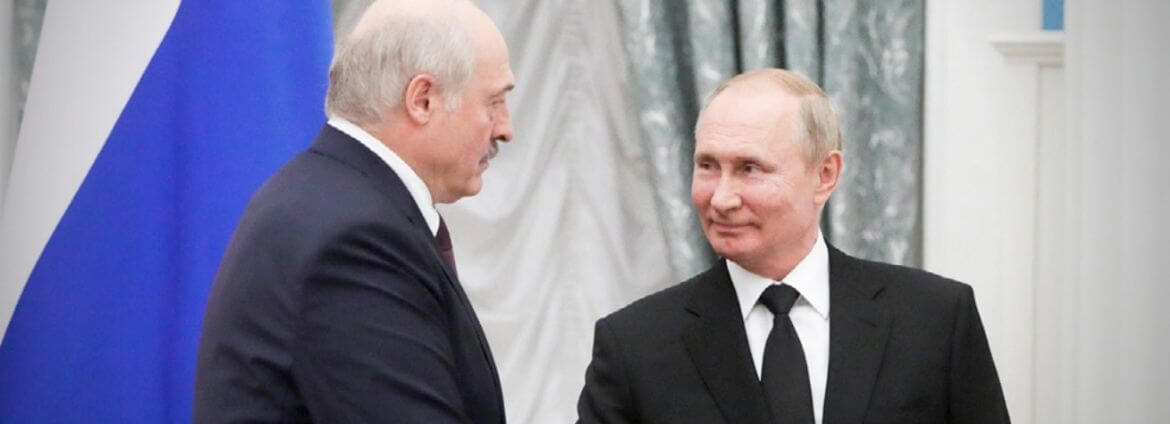- The West is waging a war against a truly sovereign state
- The “Union State” versus a reincarnation of the “Rzeczpospolita”
- Nazism, terrorism, and other sins of the West
- Calls for continued repression
- An Arab city in Lithuania and Lukashenko’s migration triumph
- Discrediting Tsikhanouskaya and Tsimanouskaya
The West is waging a war against a truly sovereign state
Not a quarter, not a month, not a week, not a day goes by without misinformation about the “color revolution” and Western provocations against Belarus (and Russia). Most of the pro-Kremlin media continue to promote the conspiracy that hundreds of thousands of Belarusians protested and continue actions of disobedience not because of falsified elections, legal collapse, and the ineffectual steps taken by those in power in the fight against the coronavirus, but at the instigation of the West and in connection with the flashing of their brains through mysterious technologies.
“However, it is quite obvious that the failed coup in Belarus was driven by the same forces as the Maidan in Ukraine, which means that the unenviable fate of a satellite was being prepared for our country – the next limitrophic project of AntiRussia, a raw material appendage and market for Western countries, and a source of cheap labor resources,” writes Sputnik Belarus.
“President of Belarus Alexander Lukashenko has been repeating the word ‘war’ for a long time and often. De facto, war has been declared against his small and economically weak, including a very real air blockade. The goal is to overthrow Lukashenko and turn Belarus into a satellite of the collective West, as happened with Ukraine,” argues Ukraina.ru, which is owned by the Rossiya Today news agency.
Often, pro-Kremlin and state-owned Belarusian media present Western sanctions not as a reaction to election fraud and large-scale human violations, but as… revenge on Belarus for its sovereignty. They say that neighboring Western countries and Ukraine are already vassals and colonies, and truly sovereign Belarus is an eyesore that keeps the hostile West awake at night.
“In recent decades, a galaxy of limitrophe countries has formed in Europe which are especially intractable and are consistent provocateurs of major conflict… They believe in the power of the U.S. and expect that the war will be waged only on Russian territory (or maybe Ukraine and Belarus, but this is an acceptable sacrifice),” writes Imhoclub, reflecting on the Baltic countries and Poland.
“The independence of Ukraine today is something of a joke. Ukraine hangs on the whims of Western patrons, on their financial handouts, and on the lethal weapons they receive for waging a brotherly war,” writes the same resource, this time regarding Ukraine.
Only Russia and deep integration with it will help Belarus to survive in a tough battle with the West, propaganda sites persist in writing. One story from Ukraina.ru formulates this narrative best:
“On July 3, 2021, this country again defended its sovereignty from foreign invasion. And again, as during the Great Patriotic War, Russia is side by side with Belarus. The aim of foreign aggressors and collaborators is to abolish independence and sovereignty. Today the nation lives practically encircled by a blockade. The former Soviet Baltics, the former Soviet Ukraine, and the former USSR satellite Poland have become part of the anti-Russian belt.”
“Yes, Belarus is an historical part of Russia, and the Belarusian people are an integral part of the Russian people along with the Great Russians and Little Russians,” writes Sputnik Belarus, fantasizing and foreshadowing the creation of the Union State. “Russia is restoring its historical space which shrunk after the collapse of the USSR. This process can be stopped only by breaking up today’s Russia, the Russian Federation, by breaking the backbone of Russian civilization. But this will not happen, which means that integration is inevitable.”
Propaganda sites maintain that Russia is obligated to help Lukashenko also because it is next in line to receive a next Western “color revolution.” As the RIA FAN agency writes:
“The Belarusian situation was viewed by the West as the first stage of the operation to overthrow Vladimir Putin. If in August-September it was possible to overthrow Lukashenko, an anti-Russian hub, a Belarusian bridgehead, would have been formed here.”
“Elections, human rights, democracy – nobody is interested in these in the West. Only geopolitics… There is a conflict between the West and Russia. And a blow to Belarus is a blow to Russia. Belarus is extremely important, as it is a bridgehead, an elevation,” agrees Imhoclub, promoting its key idea that only integration with Russia will strengthen and save Belarus.
As you can see, propaganda resources are deliberately promoting hysteria, using military terms such as “bridgehead” to create the impression of a besieged fortress in a war with the West. At the same time, the true reasons for the mass protests of Belarusians, such as falsification of elections, excessive violence by law enforcement agencies, and massive violations of human rights and the rule of law, are hushed up.
Integration with Russia is invariably regarded only positively, in contrast to the rapprochement of Belarus with the West:
“The goals of Russian-Belarusian integration – increasing the level of well-being of the nation’s citizens, expanding the country’s geopolitical agency, growing socio-economic opportunities and industrial potential – are seriously different from the goals of ‘Belarusian-European integration,’ which involve the disintegration of the single Belarusian state organism, socio-economic chaos, and civil war.”
“As for integration, Minsk is still seriously in a corner, which reduces any theories of sovereignty to zero. And the fact that Belarus will retain its protector, flag, coat of arms, and anthem, but economically and economically will become an organic part of Russia, is also good news. At least something gives us hope,” says Ukraina.ru.
The “Union State” versus a reincarnation of the “Rzeczpospolita”
Discussions about integration with Russia in pro-Kremlin media often boil down to the image of a struggle against the so-called “Rzeczpospolita” as an expression of Polish and Western influence.
“In the years after the destruction of the USSR, Russia’s geopolitical opponents, in particular Poland, have created an influential network in Belarus. The “deep Rzeczpospolita,” represented by certain people with certain ideas and interests, have all these years pushed Belarus towards a multi-vector approach,” one of the commentators for RIA FAN shares.
Teleskop called Lukashenko’s speech at the celebration of the so-called National Unity Day (September 17) a manifesto of “Western Russianism” and wrote about the struggle against the “Rzeczpospolita”:
“Praising Stalin for the return of Black Russia and talking about the Belarusian, that is, the Russian cities of Vilna and Bialystok, Lukashenko challenged Rzeczpospolita and Lithuania, reiterating his position of intransigence towards Nazi collaborators and the Bandera regime in Kyiv.”
In the opinion of the same publication, “the fire of ‘Livinism’ and ‘zmagarstvo’ that destroys hearts and minds can and must be disrupted by the ‘counterattack’ of ‘Western Russianism.’ Therefore, the ‘cognitive’ Union card is the most important thing and without it everything could turn to dust and NATO bases near Smolensk could crop up.”
In general, it is Teleskop that could be called the most active media fighter against “Litvinism,” “Polinization,” and the “deep Rzeczpospolita.” Its editor, in the third quarter of 2021, continued spinning falsehoods about the history of Belarus and the identity of Belarusians. For example:
“The Russian world is a civilizational, psychological, historical, cultural, and linguistic unity of people, ethnic groups, and nations that recognize the Russian civilization as their civilization and the Russian language as their native language, regardless of their ethnic, racial or religious origin. To deny the belonging of Belarus to the Russian world means to deny the very history of Belarus.”
According to the story’s author, the national idea of Belarusians is the “Russian Union.” Under this name since July of this year the civil initiative “Union” has been operating, uniting activists who deny the agency of the Belarusian people. This initiative, the Teleskop website proudly notes, “turned out to be almost the only organization in the post-Soviet space that set itself the task of reintegrating the two branches of the Russian people.”
Renaming the initiative will not affect its mission. It “will develop integration processes and fight Russophobia.” It is argued that “the main task of the ‘Russian Union’ is to protect the civil rights of the indigenous Russian population and defend the interests of the triune Russian people – Great Russians, Little Russians, and Belarusians throughout the post-Soviet space.”
Nazism, terrorism, and other sins of the West
In an effort to denigrate Western countries and juxtapose them with a more just, moral, and humane Russian civilization, propaganda sites, as before, use their classic technique of identifying them with Nazism and fascism, as well as colonialism, terrorism, and other cannibalistic -isms.
“In 1944, he (Adamkus) was part of the circle of Antanas Impulevičius, nicknamed ‘the butcher of Minsk,’ who was an organizer of the massacres of Jews in Belarus. The General Prosecutor’s Office understands everything perfectly. But the Swede’s proteges are not faced with the task of bringing the surviving torturers to real criminal responsibility. The subject of collaborationism needs to be made relevant to remind the world of which countries Hitler’s henchmen took refuge and where they managed to build a successful political career,” writes RuBaltic, sharing fabrications about the former Lithuanian president.
Regnum, for example, claims that the Catholic Church, as a conductor of Western interests in Belarus, “popularizes the work of Nazi accomplices.”
Regarding modern Western colonialism and the imperial designs of Poland, an entertaining conspiracy theory coming from an Izborsk Club commentator was shared in an interview reprinted by Imhoclub:
“The New Rzeczpospolita is one of three British projects that they have been implementing since the late 1980s and early 1990s. I would like to draw your attention to the fact that the British had the most interest in the destruction of the Soviet Union. Britain is implementing three projects. The first project is the “New Rzeczpospolita,” the second is the “New Ottoman Empire,” and the third is “Greater Waziristan.”
According to several pro-Kremlin websites, the West is also promoting terrorism in Belarus. The well-publicized incident of the shootout of Andrei Zeltser and the KGB officer and the media echo surrounding it is interpreted as a Western provocation, despite the absence of any evidence of this from the Belarusian authorities. RuBaltic wrote:
“The murder of the Belarusian KGB officer has resulted in public approval of the leaders of the Belarusian opposition abroad. The decision to play all-in could not have been made by them without coordination and security guarantees from the countries in which they are staying. In turn, these countries can choose such a tough line towards Belarus only by agreement with the U.S. and leading European NATO countries. The West then has chosen a course towards the deployment of terrorist activity in Belarus as a new tactic in the fight against Lukashenko.”
Sonar2050 repeatedly in the third quarter laid out a conspiracy about secret malicious American biolaboratories in post-Soviet countries. “The U.S., with the help of bilateral agreements, took control of the epidemiological control system in CIS countries. The only former Soviet republic where there was no biolaboratory is in Belarus. In taking control of laboratories with strains of dangerous viruses and bacteria, the U.S. replenished their collection of microorganisms,” the site wrote.
The main message of such conspiracy theories, disinformation, and manipulation is as follows: what kind of discussion can there be of relations with a Nazi and terrorist West?!
Calls for continued repression
Many pro-Kremlin sites evaluate the mass repressions in Belarus positively, viewing them as a godly struggle against Western and Belarusian influence in favor of the Russian World.
Purges and repressions are good, but the space left by pro-Belarusian organizations and media should be filled with pro-Kremlin ones, invites EADaly:
“The process of cleansing Belarus from the opposition-minded part of society and radicals that has unfolded in recent months can bring the results desired for the nation’s authorities only in the short term. If the state does not take further steps to fill the resulting voids in the socio-political and information space, the situation in the country may return to that which developed on the eve of the 2020 presidential elections.”
Ukraina.ru applauds the mopping-up of non-governmental organizations (which allegedly were preparing a coup), but also calls for pulling them out at the root and go even further:
“Half measures will not do. And this means that these ‘cleansings’ should not be used for bartering with the West and not to put things on hold, but precisely for disinfecting the country from agents of hostile countries. That is why the root of evil is not separate cells, but the Eastern Partnership, which had to have been left by slamming the door.”
Speaking of the Eastern Partnership (EaP), Regnum generally believes that the EaP as a project is needed by the EU “only in order to siphon more resources from the rapidly aging and dying outskirts of the former USSR.”
Teleskop published an entire appeal by pro-Kremlin activists to the security forces, urging them to act more decisively:
“At present, after the restoration of order and tranquility by the security forces in Belarus, civil servants opposed to the existing historical order and at the same time infected with nationalist hysteria (most of whom are ‘entrenched’ in the Ministry of Education, the Ministry of Culture, the Institute of History of the National Academy of Sciences of Belarus, the Ministry of Foreign Affairs and other institutions) switched to a ‘dormant’ mode.”
However, not all pro-Kremlin sites share optimism about the repressions, fearing that pro-Russian initiatives will eventually fall under their flywheel. Regnum, for example, published the following:
“Now in Belarus a total ‘cleansing’ of the pro-Western opposition is taking place, which the ‘yabatki’ and short-sighted marginalized ‘Russians Worlders’ openly celebrate. But there is not much to rejoice at. The pendulum could swing in the other direction at any moment. Already, ‘Batka’s experts,’ who recently justified the ‘turn to the West’ and demonized Russia, call supporters of all-Russian unity the fifth column on Russian television.”
Sonar2050 is also skeptical about the repression, noting that they started to beat everyone indiscriminately:
“In addition, the mass liquidation of NGOs will not solve the problem of the socio-political crisis. […] In Law enforcement agencies, courts, and registration bodies are now dealing with NGOs. They cannot have a flexible approach. Therefore, even those organizations that could potentially not be in opposition to the authorities and were not funded by foreign opponents are being closed.”
An Arab city in Lithuania and Lukashenko’s migration triumph
A special category of stories in the third quarter is represented by materials on the migration crisis on the border of Belarus with the European Union. Against this background, dozens of articles were published that denigrate the EU countries neighboring Belarus, especially Lithuania.
“Lithuania is pursuing a very strange, if not suicidal, policy. This is because it is a puppet of the U.S.,” Imhoclub categorically claims.
“Lithuania is a state that is not exactly a loser, but in my opinion, it is not an established state at all. For the entirety of its recent existence, starting from 1991, it has lived at the expense of its neighbors and for whom it has made life miserable with great enthusiasm. Gradually, Lithuania, through confrontation with its neighbors – Russia and Belarus – has turned into a permanent source of income,” said a commentator for Teleskop.
According to Ukraina.ru, “Lithuania is at the forefront of the buffer states of the anti-Russian belt,” while the Lithuanian authorities allegedly “admit that they have no evidence of the involvement of the Belarusian authorities in the transportation of migrants.”
One story from Imhoclub praises Lukashenko’s migration response to the West: “Great job, Batka! As modern youth would say with respect, ‘80th level trolling!’ Modern geopolitics is continuous, open-ended trolling. Batka plays by its rules and wins. This is according to the principle of you broke everything for me here, playing your little Maidan, and now I’ll fix the kind of Maidan for you that that won’t seem so little. And that’s what he did.”
RuBaltic also calls Lukashenko triumphant:
“The development of the migration crisis in Lithuania can be considered a political triumph for Belarusian President Alexander Lukashenko: he knocked the map of the struggle for human rights out of the hands of Vilnius and thereby devalued the efforts of Lithuanian diplomacy to establish an international tribunal for the Belarusian authorities, at which Lithuania and Belarusian opposition members stirred up by Lithuania would set the tone.
“The Arab world has shown very clearly how it treats such ‘grunting satellites’ of the U.S., such as Lithuania, which loudly approved of all the Americans’ madness in destroying normal life in the Middle East,” reads one story by RuBaltic.
“A nightmare for Lithuania: a whole city will be built for Arab migrants,” writes RuBaltic. According to the resource, apart from negotiating with Lukashenko, Lithuania can only push for a reduction in flights to Belarus from Middle Eastern countries.
Imhoclub predicts a blood feud in Lithuania from migrants’ relatives:
“The Lithuanian authorities do not understand what they have gotten themselves into and how incompetent their steps have been, which only exacerbate the problem. They hope that they will use violence to scare away migrants from crossing the border and turn them back. This misconception will quickly dissipate. Relatives and compatriots of those killed, account for which has already started, may begin to take revenge on Lithuania.”
The situation in Lithuania is so bad, Regnum conceives, that the Lithuanian authorities plan to use the Vatican as an intermediary to persuade Minsk to sit down at the negotiating table:
“However, the Vatican has access to Minsk. Apparently, the Lithuanian conservative government would like to use this resource now to hold closed negotiations with the Lukashenko administration to secure at least a temporary truce with Belarus on the migration problem.”
And this is not simple, because, says Imhoclub, “the only certain condition for returning to dialogue with the West could be the reversal of sanctions.” And no matter how much the West does not like the geopolitical choice, the socio-political system, or the Belarusian socio-economic model, it must recall them.
As for Western sanctions, including those on Belarusian fertilizers, they harm Lithuania more, RuBaltic notes: “In the context of the transit crisis, Vilnius will have only one option – to go to the West with an outstretched hand and ask the European Union for additional subsidies that will help compensate for budget losses.”
It would be fair to say that not all pro-Kremlin sites are delighted with the migration situation at the border of Belarus and the EU. Regnum is concerned that at least some of the illegal migrants from the Middle East will eventually move not to Western countries, but to Russia:
“On the whole, an analysis of the situation on the border of the EU and the Union State does not at all inspire optimism. On the contrary, it raises more and more questions, specifically about the channels of entry to Russia of migrants who are not citizens of the CIS.”
Discrediting Tsikhanouskaya and Tsimanouskaya
Pro-Kremlin media continued to ridicule Svetlana Tikhanovskaya and other Belarusian politicians and activists. As we wrote earlier (https://isans.org/analysis/monitoring-ru/faktor-navalnogo-i-novye-kraski-v-ochernenii-tihanovskoj.html), the tone of the Belarusian and Russian propagandists defaming and insulting Sviatlana Tsikhanouskaya was set by the head of Russia Today Margarita Simonyan in the August edition of 60 Minutes on the Russia 1 television channel when she compared the mental abilities of the Belarusian leader with an orangutan.
If in the second quarter propaganda sites trumpeted that the meeting between Tsikhanouskaya and the U.S. President was not on the horizon, then when it did take place, the emphasis in stories from the third quarter were run citing its insignificance. As RuBaltic wrote, “it takes Biden more time to eat one meal than he had for the ‘elected leader of Belarus.’
The same site, in another story on Ukraine’s position on Belarus, bestowed on Vladimir Zelensky and Sviatlana Tsikhanouskaya unflattering epithets:
“A buffoon and a kitchen maid who consider themselves to be outstanding politicians. The only difference is that one is already selling off his country, while the other is waiting for her finest hour.”
EADaily also practiced creative discrediting of Tsikhanouskaya, comparing her to the famous adventurer from the novels of the Soviet writers Ilf and Petrov:
“Its main task is to irritate the government in Minsk and, through it, Moscow. Everything else has ceased to seriously interest Brussels and Washington, although the Belarusian opposition is trying to maintain the illusion of their importance for the international community. Sviatlana Tsikhanouskaya is increasingly beginning to resemble Ostap Bender, and all her actions are turning into outright fraud.”
The propaganda media did not miss the opportunity to build conspiracy theories around the scandal with the Belarusian athlete Krystsina Tsimanouskaya at the Olympic Games in Japan.
“The implementers of the Belarusian crisis in the West are stubbornly looking for a new opposition leader for Belarusians to replace those who have long ceased to inspire supporters to fight Lukashenko. Through these efforts, the most unexpected projects appear, such as Tsimanouskaya,” says RuBaltic.
Ukraina.ru echoes this: “We have changed the ‘kh’ to ‘m’ [note: similarities of last names of Tsikhanouskaya and Tsimanouskaya in Russian spelling is meant], but the coup still will not be successful.”
The publication “popularly” explains the international intrigue surrounding Belarus, Ukraine, and Russia:
“Ukraine [the West] is needed in three, if I may say, hypostases: as a testing ground where technologies and techniques for influencing power and society in countries that the West have doomed to ‘democratization’ according to their templates are developed and tested; as a springboard for training to influence the ‘enemy’; and as a battering ram – a tool that is prepared on the training ground and the bridgehead and from which they strike against Russia directly and indirectly through Belarus.”
And if there is nothing new in the discrediting of Tsikhanouskaya, then it is still strikingly different – how incredible the anti-Western conspiracy is and how pro-Kremlin resources are ready to fabricate stories around any high-profile incident related to Belarus, as in the case of the athlete Tsimanouskaya.
Материал доступен на русском языке: Интеграция с Россией как спасение от нацистского Запада










